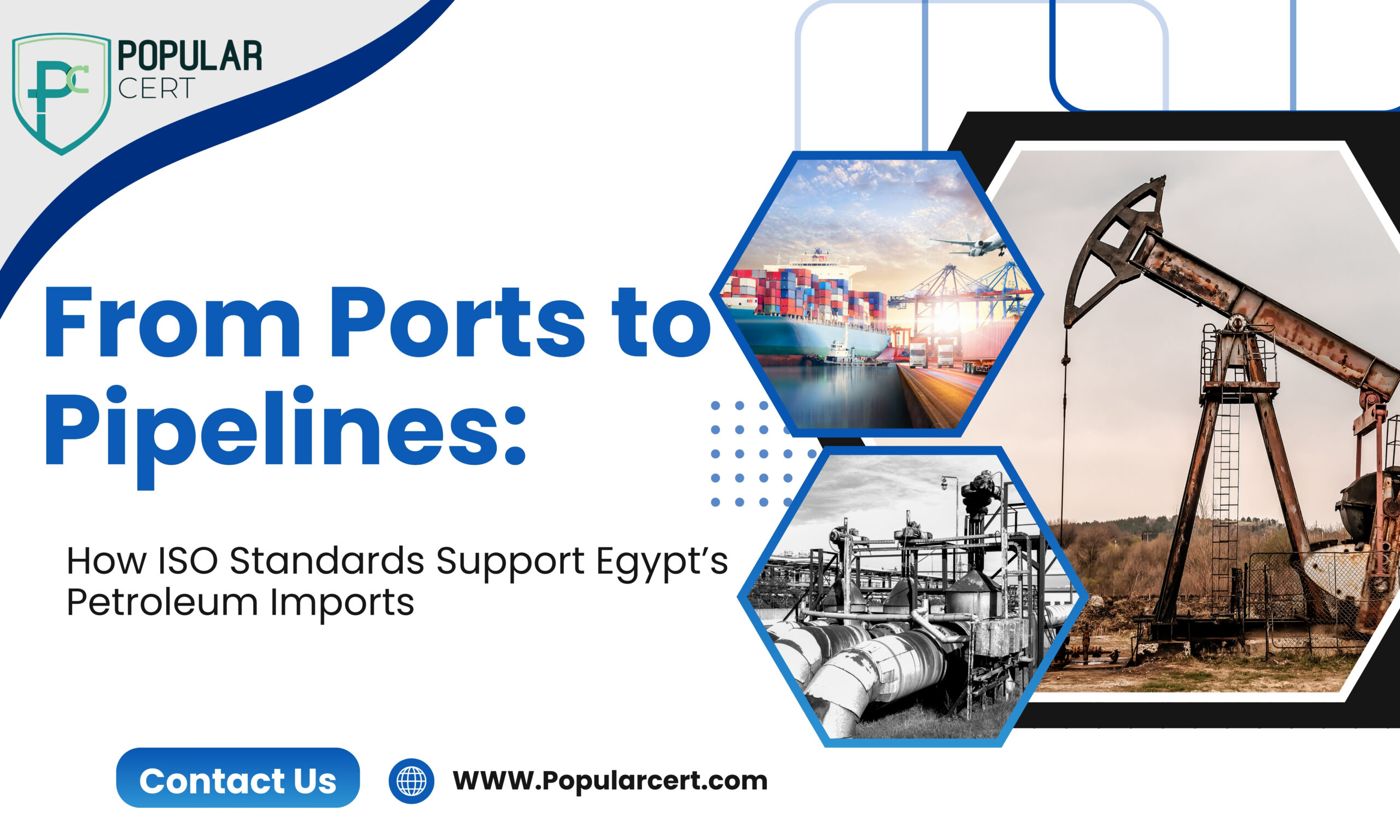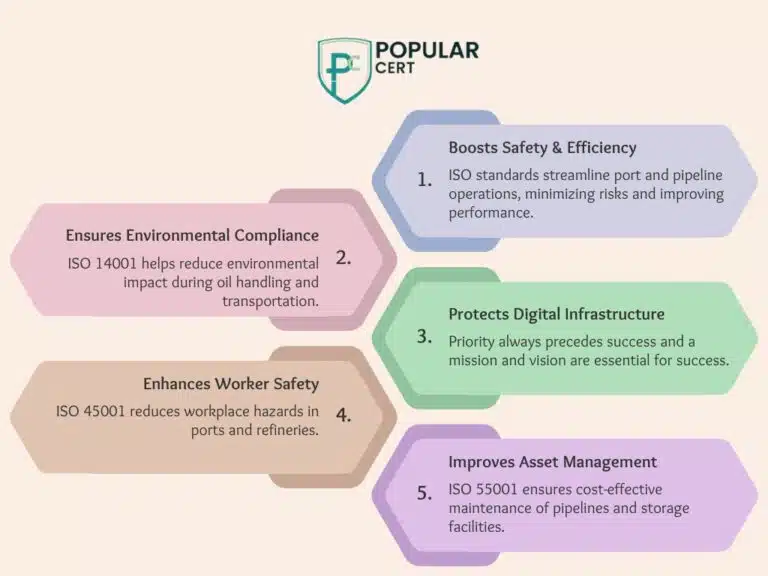From Ports to Pipelines: How ISO Standards Support Egypt’s Petroleum Imports

Take a stroll on Egypt’s Mediterranean coast and you’ll notice large port terminals with ships discharging crude oil and tankers waiting in a planned order. Behind the scenes of this elaborate choreography lies a tremendous force ISO certification maintaining everything moving in a safe and efficient manner.
In Egypt, petroleum serves as more than just a source of fuel. The country imports and refines millions of barrels of oil to satisfy the ever growing domestic market and industrial needs. With modernization, ISO standards ensure quality, safety, and sustainability when oil is brought into the country, right from the port.
Let’s take a journey from the docks to the depots and discover how ISO standards are supporting Egypt’s petroleum imports and why they matter now more than ever.
Egypt’s Growing Need for Petroleum Imports
Egypt’s activity in oil and gas dates back a long time, but because of the increasing local consumption and changes in production, the country now imports large quantities of petroleum. These imports come through important ports such as Ain Sokhna, Alexandria, Sidi Kerir, and others which culminates to form a network of pipelines and refineries throughout the country.
To handle effectively and safely this intricate flow, international standards are necessary. A slight inefficiency in systems can lead to expensive mistakes in spills, interrupted supply, or catastrophic threats to the environment.
This is where ISO certification becomes a game-changer.
ISO Certification: More Than a Label
Seeing “ISO certified” on a company’s profile isn’t just a title; it means that they have integrated international benchmarks into their organization. In the case of petroleum imports, this goes all the way from port operations to cyber risk management for environmental safeguards and storage safety.
This is how ISO standards add real value to the Egyptian petroleum supply chain:
1. At the Port: Where the Journey Begins
Incorporating international standards helps boost facilities wherein petroleum products are received via ocean trade in the following manners:
- Verification of quality: With the implementation of ISO 9001 (Quality Management System), Importers are able to perform quality checks on cargoes that aids in preserving the goods, as well as ensures uniformity and consistency in product quality control.
- Safety is prioritized: ISO 45001 (Occupational Health and Safety) helps protect workers operating in hazardous port environments. Proper safety protocols, training, and risk assessments are mandatory.
- Increase in efficiency: Ports have a smoother workflow and better control over the amount of oil they store and process. This is made possible because of the strict adherence to standardized protocols that eliminate significant delays in offloading and storage.
A single mistake at this stage—like a valve malfunction or missed inspection—can create chaos. ISO ensures there are checklists, protocols, and accountability built into every step.
Types Of Certification
- ISO Certification
- ISO 9001 Certification
- ISO 14001 Certification
- ISO 45001 Certification
- ISO 22000 Certification
- ISO 27001 Certification
- ISO 17025 Certification
- ISO 13485 Certification
- ISO 20000-1 Certification
- ISO 22301 Certification
- ISO 50001 Certification
- ISO 37001 Certification
- IATF 16949 Certification
- ISO 29001 Certification
- ISO 31000 Certification
- ISO 20121 Certification
- ISO 10002 Certification
- ISO 41001 Certification
Get Free Consultation
Our Clients


















2. Storage and Handling: Keeping It Safe and Sound
After offloading, petroleum is temporarily stored in huge tanks, which is where ISO works in the background. “ISO” in this case refers to “International standard organization” which is vital for the petroleum industry.
- ISO 14001 is an important standard as it prevents emissions, leaks, and waste whenever possible. Storage facilities have to control fuel vapor emissions, stormwater runoff, and soil contamination.
- ISO 45001 ensures that all personnel within the premises are trained for emergencies and are able to respond to fire or chemical exposure.
- Business continuity plans encompassing power outage contingencies and equipment failure planning are covered under ISO 22301. This ensures that there will always be business flow in the supply chain.
These standards create a safety net so even if something goes wrong, there’s a structured way to respond and recover.
3. Pipelines and Transport: Moving with Confidence
After storage, petroleum is transferred through pipelines and trucks around Egypt. Problems with this stage can result in expensive delays and even spills or accidents.
- ISO 39001 (Road Traffic Safety Management) aids trucking logistics service providers in mitigating petroleum truck accidents by implementing outdated safety protocols and maintenance policies.
- ISO 55001 (Asset Management) oversees the ongoing and efficient spatial allocation of investments on the pipeline infrastructure to guarantee proper maintenance.
- ISO 27001 (Information Security) is vital as Egypt digitizes its pipeline monitoring and fuel tracking. It protects sensitive operational data from cyber threats.
With ISO, Cross Egypt petroleum movement can be done in a safe, secure, and timely manner.
Real Impact: How ISO Certification Improves Business
Still wondering how ISO makes a difference on the ground? Let’s break it down with a quick example:
Company A vs. Company B
- Company A: Not ISO certified. Business handles petroleum imports with inconsistent safety measures, and doesn’t keep record of their activities and enact environmental measures.
- Company B: ISO 9001, 14001, 45001 certified. Relies on standardized methodologies, regularly scheduled audits and enforces good safety measures.
Now picture there’s a small spill during offloading.
- Company A has to go through a delay, investigation, and reputation damage.
- Company B manages the situation in the proper manner, accurately reports and resumes their operations with little disruption.
ISO doesn’t prevent every problem—it prepares businesses to manage them better.
Why ISO Standards Matter More Than Ever in Egypt
Egypt is strengthening its energy infrastructure to satisfy the rising auxiliary and commercial demand, as well as to maintain its position as a leader in regional energy trade. However, the expansion strategy adds layers of intricacy, increasing operational risk.
This is why ISO certification is vital for Egypt’s petroleum sector at this very moment:
Reduces Operational Risks
ISO provides companies the ability to prevent, detect and respond to risks, ranging from fire, leaks and even cyber risks, across the entire supply chain.
Boosts International Partnerships
Global oil suppliers tend to have long lasting contracts with ISO certified companies since compliance certifies a degree of professionalism and appropriateness. It enhances integrity and avoids ambiguity.
Improves Environmental Performance
During the global transition to cleaner forms of energy, Egypt needs to oversee the petroleum sector responsibly. ISO 14001 encourages cleaner emission practices and sustains the lower emission effects and scrubbers.
Supports Regulatory Compliance
Compliance to international standards by the Egyptian government and trade bodies is fast turning into a mandate. With increasing rules and chances of penalties, ISO helps businesses navigate regulation gridlocks with foresight.
Popular ISO Standards in Egypt’s Petroleum Sector
Here’s a summary of ISO certifications most relevant to petroleum imports:
ISO Standard | Focus Area | Benefits |
ISO 9001 | Quality Management | Improves product consistency, customer satisfaction |
ISO 14001 | Environmental Management | Reduces environmental impact, ensures legal compliance |
ISO 45001 | Occupational Health & Safety | Protects workers, reduces accidents |
ISO 27001 | Information Security | Protects data, builds digital trust |
ISO 55001 | Asset Management | Ensures infrastructure is maintained and cost-effective |
ISO 22301 | Business Continuity | Prepares for disruptions, strengthens resilience |
ISO 39001 | Road Traffic Safety | Enhances transportation safety for petroleum logistics |

The Path to ISO Certification in Egypt
Obtaining an ISO certification in Egypt could appear daunting at first, especially in a critical and highly regulated industry like petroleum. Nevertheless, with effective help, the journey becomes simple and very fruitful. For companies in Egypt, whether at the ports, managing storage facilities, or controlling pipelines, the ISO certification process not only ensures compliance, but also enhances business growth.
Here’s how the path to certification usually works:
1. Gap Analysis
This is where it all begins. Professionals evaluate procedures and practices and compare them with ISO standards. It assists in determining what is performing optimally, as well as what requires refinement. This step lays a strong groundwork for your certification journey.
2. Documentation
Once gaps have been established, gaps need to be filled through creation or amendments of structured documents which also align with ISO standards. A good documentation structure maintains consistency and enables everyone to follow one agreed upon set of rules. This includes quality manuals, safety manuals, environmental policies, and standard operating procedures.
3. Training
Educating the team comes after documenting the processes. This training covers all facets of their positions in the ISO as well as safety, reporting and record keeping. This creates awareness and ownership, which is critical to success.
4. Implementation
Now you are ready for the actual work. You will use the outlined procedures in your day-to-day activities as outlined. This stage involves data capture, evaluation of performance, and addressing issues as they come up. This is the stage where the actual shift occurs from theory to practice.
5. Internal Audit and Management Review
An internal audit is done at this stage to ascertain that everything is functioning as planned before coming to the last step. The system performance is also reviewed by top management to check whether the set goals are achieved and critical changes are made as required.
6. Certification Audit
A certified external auditor verifies whether your organization meets the ISO requirements. Providing all is in order, you will gain your ISO certification, an award that is internationally recognized in terms of quality, safety or environmental responsibility.
Why Choose Popularcert?
At Popularcert, we provide ISO certification services to enhance the competitive edge of Egypt’s busy petroleum import terminals and inland pipeline operations. Having local knowledge and international credentialing mastery, we guide your company through calibration red tape and compliance and safety constructs, tailoring our process to meet your goals. Our transparent approach simplifies and clears the fog from documentation and auditing processes, completing everything for you in a timely manner. We help you certify your credentials and then assist you in maintaining compliance systems support and improvement while your processes are critiqued, tailored, custom-fit, and tested to the dynamically evolving environment to ensure they remain inline.
GET A FREE CONSULTATION NOW
FAQ
Why is ISO certification important for petroleum companies in Egypt?
ISO certification helps petroleum companies improve safety, reduce environmental risks, and maintain high-quality operations. It also boosts credibility with international partners and ensures compliance with both local and global regulations—especially crucial in Egypt’s growing energy and import sector.
Which ISO standards are most relevant for petroleum imports and pipeline operations?
The most important ISO standards for this sector include ISO 9001 (Quality Management), ISO 14001 (Environmental Management), ISO 45001 (Occupational Health & Safety), and ISO 50001 (Energy Management). These standards help businesses operate safely, sustainably, and efficiently from ports to pipelines.
How long does it take to get ISO certified in Egypt’s petroleum industry?
The certification timeline can vary depending on the size of your company and current processes. However, with the right support and preparation, many companies complete the process in 3 to 6 months. Popularcert helps fast-track this with expert guidance at every step.
Can small or mid-sized petroleum businesses also get ISO certified?
Absolutely. ISO certification is not just for large corporations. In fact, small and mid-sized enterprises in Egypt benefit greatly by improving their operations, gaining trust from international clients, and standing out in the competitive petroleum market. Popularcert offers customized, affordable solutions for businesses of all sizes.
